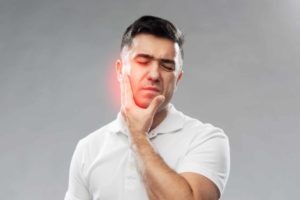
Problem: “My mouth doesn’t do a good job of crushing food. I’m having chewing difficulties, and it’s causing problems. For instance, I only want to eat alone because I may have to spit out food or have problems swallowing. I’m also concerned about digestion and nutrition; could this problem cause more serious issues for me?”
Solution: “We tend to take for granted simple tasks like chewing food until we can’t do them, then their importance is magnified. The inability to properly grind up your food is a nagging, potentially harmful problem. Fortunately, a visit to a good restorative dentist can help you find out if the problem is with your teeth.”
In this article, you’ll learn about:
- common causes of chewing difficulties
- why those issues occur
- how to correct them
- what foods to eat in the meantime
- how to find a great dentist who’ll help
Reasons You May Experience Chewing Difficulties
Let’s explore how each of these can cause problems with chewing.
Loose teeth, including loose dentures, are unpredictable
While loose natural teeth can cause pain, dentures are the primary culprit when it comes to difficulty chewing foods. If your dentures wobble or slip out of place when you eat, it’s time to either have them relined, order a new set, or graduate to implant-retained dentures.
Dentures become loose when they aren’t made to fit well or, most often, when they’ve been worn for years. The bony ridges under your gums incur friction against the underlining of your dentures. Over time, the bones are remodeled to become smooth, and ridges disappear.
When this happens, gaps occur between the denture and gums. Relining a denture involves reshaping the underlining so that it fits against the reshaped bone and gums. When a denture is lined to fit properly, denture adhesive should hold it in place.
To eliminate all slipping and wobbling with your denture, consider attaching it to four to six implants. Secured in the jawbone, dental implants replace teeth roots to form a reliable anchor for dentures.
Sore teeth or gums can cause chewing difficulties
Gum disease, tooth decay, chips or cracks, failing dental work, internal dental infection, abscesses, oral cancer, and soft tissue lesions can cause significant discomfort in the mouth. Add the task of chewing, and these issues become quite painful.
A thorough examination with your general dentist should uncover the causes of your tooth or gum pain. Treating dental problems is the only way to resolve them. Without treatment, your chewing difficulties will worsen.
Canker or cold sores, cuts, or other abrasions should heal naturally. If you notice a sore that doesn’t get well in two weeks, see the dentist. Oral cancer presents as irritation or a white, red, or purple lesion. Oral cancer must be treated or it may worsen and spread.
Jaw joint pain, also called TMJ pain, can cause chewing problems and make your jaw muscles feel tired or overworked
The two temporomandibular joints on either side of the skull let your jaw open, close, and move right and left. TMJ disorder also causes migraines, ringing in the ears, headaches, neck/shoulder/face pain, and even tingling fingers and toes.
The TMJs may hurt if they aren’t in the right position to fully rest when the jaw is closed. Injury or birth defects may be to blame, but a misaligned bite is a common cause. When top and bottom teeth don’t fit together like a puzzle when the mouth is closed, the TMJs can’t rest.
Muscles and nerves around the joints, and the disc between the bones, become irritated. Dentists can correct the fit of upper and lower teeth together (called occlusion) or offer a mouth guard that holds the jaws in a position where they can rest.
A stroke can cause jaw control problems that interferes with chewing and swallowing foods
The lower jaw, lips, and tongue work together to move food around the mouth so that it can be chewed. If any of the muscles in these areas don’t function as they should, chewing won’t be effective.
For muscle issues, a medical doctor should be consulted. Muscles dysfunction for many reasons. If your condition is treatable, you may regain the ability to properly chew and swallow food. If not, your diet will need to be changed so that you get proper nutrition, despite chewing difficulties.
Dry mouth is a condition that comes with age, but it’s also a side effect to many medications
When adequate saliva isn’t available to moisten and help break down food, proper chewing and predigestion simply can’t occur.
You could talk with your physician about changing medications if alternatives are available that don’t cause dry mouth. The easiest treatment is using over-the-counter artificial saliva. Biotene is a popular brand that comes in mint flavor to freshen breath, as well.
Eat This, Not That
For easier eating, you can puree foods or cut your food into small pieces if you have trouble chewing. Also, keep a glass of water on hand to help wash down food and keep your mouth moist. See your dentist or medical doctor to correct the underlying problems that cause chewing difficulties.
Until you get treatment, soften your diet. Choose foods that are easy to chew. Avoid dry foods that are crunchy. Eat moist foods that come in a non-solid state, like yogurt, stewed veggies, sweet potatoes, soups, casseroles, and smoothies. Avoid chewy foods, like steak, crusty bread, and fresh vegetables.
You may want to add meal replacement shakes to your diet. They contain nutrients and vitamins, as well as protein to make you feel satisfied.
Get Well Soon
Don’t settle for living the rest of our life with chewing difficulties. Add a registered dietitian to your health care team. Find a dentist and physician who will help you regain the ability to chew foods well. People in the Chicago area can call Dr. James Fondriest in Lake Forest. He offers oral health solutions from simple crowns to full mouth restoration.
